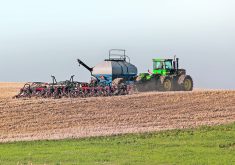I was in Ottawa for the annual Grow Canada conference. I had in my mind that I would stroll downtown, visiting all the agricultural associations and groups to which I have some connection.
I did that and found myself very close to Parliament Hill. The walk back to my hotel would take me right by it and I had some sight-seeing and Christmas shopping to do.
I bought hockey sticks and a puck at the Parliament Hill gift shop for my nieces and nephews. The sticks are those small ones I used to play with as a kid. Using those orange hard balls as pucks, I left my indelible mark on our basement drywall.
Read Also

Budget seen as fairly solid, but worrying cracks appear
The reaction from the agriculture industry to prime minister Mark Carney’s first budget handed down November 4th has been largely positive.
I left the gift shop, left the building and met a security guard on the down ramp.
“Is there anything else I could/should do while I am here?” I asked.
“Well, you could take in question period,” he said. “It starts in just over an hour.”
When I re-entered the Parliament Building, they took away the hockey sticks and puck that I had purchased in that same building only moments ago. Security will not let you enter the gallery (where people can observe question period in the House of Commons) in possession of anything you can throw.
If you’ve ever witnessed question period, you may have a sense of where this is going.
At some point, while people are still filing in, MPs begin reading their member statements. These are statements related to an MP’s riding that can range from congratulating a local community group for raising money for a charity or a strong position on a certain topic that his or her riding feels Parliament needs to address.
Whatever the message, very few people are listening.
This is the process. These statements are read for the record. MPs are neither required nor expected to listen.
However, if the statements began with a joke or some other literary tactic that didn’t sound like a corporate news release, the murmurs would stop, heads would turn and the Commons would listen.
The difference between one of these statements, as ceremonial as they are, reaching a captive audience and possibly making an impact or being archived and forgotten could be as simple as moving some paragraphs around or inserting a joke.
Agriculture suffers from taking itself too seriously and scripting itself in dry, uninteresting ways. We feed the world. We are stewards. We make serious business decisions in a global arena. Blah, blah, blah.
But are we engaging? Do we appreciate sharing our messages in ways that stand out and make people want to listen?
We are not and we do not, and the difference between the ag industry continuing along this path or finding ways to correct our course may be the difference between people not paying attention to us or us making an impact.
Let’s make our messages interesting. If you’re bored by something, others likely are too.
No matter the audience, if what you have to say is uninteresting, you will lose people.
Ground-breaking research has failed to reach the people who could benefit from it because it hasn’t been extended properly. Policies have gone unchanged or undeveloped because the recommendations weren’t clear. And countless important emails haven’t been responded to because their contents read like white noise and were not prioritized.
I left the gallery as parliamentary theatrics were just starting to really amp up — opposition leader Pierre Poilievre was attacking prime minister Justin Trudeau over something very trivial. There was booing and here-hereing.
I picked up my hockey sticks and puck at security and went back to my hotel with the renewed conviction that what we say and how we say it are some of the most important considerations of our industry. We should take these things seriously.
Toban Dyck farms in southern Manitoba and shares his thoughts through media platforms.















